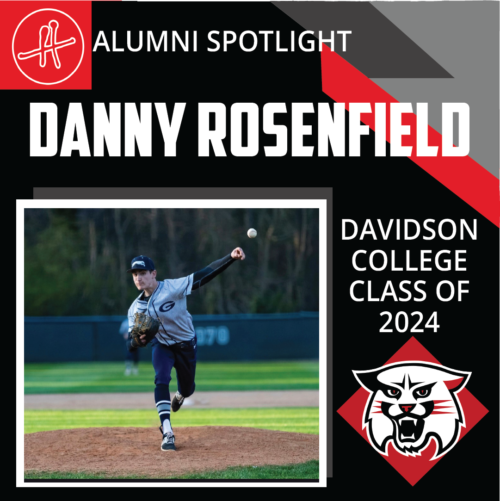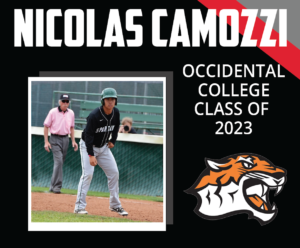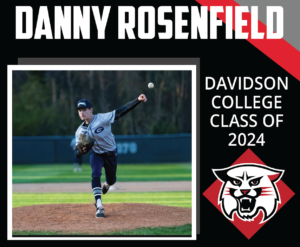



March 29, 2019
At Headfirst Honor Roll Camps, we are always thrilled to hear from our alumni about their success stories in the recruiting process – and to share their journeys with other student-athletes still searching for the right fit at the next level. Below, we highlight two of our alumni who leveraged their hard work on the field and in the classroom to continue their baseball careers at high-academic schools as they share their experiences in the high-academic recruiting process, advice for student-athletes pursuing a similar goal and how Headfirst helped them along the way:
 1B/3B Nicolas Camozzi – Occidental College, class of 2023
1B/3B Nicolas Camozzi – Occidental College, class of 2023
What do you know now about the high-academic recruiting process that you wish you knew when you were going through the recruiting process?
The biggest thing was to talk to as many coaches as possible, even if you’ve never heard about the school before. I spoke with some coaches towards the end of the showcase, and I kept in touch with those schools and heavily considered each of them.
What impact did Headfirst Honor Roll Camps have on your recruiting process? What lessons did you learn that helped you later on in your recruiting process?
Be a good person at all times on the field, both to coaches and other athletes. It’s important to keep your composure and have good body language throughout the two days. Always play at 100%, and give your best effort every pitch*.
How did your recruiting process compare to your high school or travel ball teammates that were not pursuing a high-academic school?
I focused more on becoming a well-rounded student-athlete rather than only focusing on my on-field performance. The goal for academic schools is not to play professionally, but play because you enjoy the competition. The D1 students who were pursuing athletics focused solely on baseball and not as much on their grades, while high-academic schools teach more about life skills and the need to balance baseball and school.
What is the best piece(s) of advice that you would give current high school student-athletes looking to play at a high-academic school?
Don’t be shy with the coaches, and be outgoing and friendly to everyone because you never know where you may end up. Always give your best effort, and it’s okay if you strike out or make an error. What matters is your energy, effort and composure on the field.
* At Honor Roll, we talk a lot about how to stand out to college coaches by “controlling the controllables.” Take a look at the full blog post: “How do I stand out to a college coach at a showcase or tournament?”

What do you know now about the high-academic recruiting process that you wish you knew when you were going through the recruiting process?
I never quite realized that academics were just as important, if not more important than baseball in the recruiting process with high-academic schools until I began getting serious about committing to these schools. I am very glad I took my freshman and sophomore years seriously because those grades mean just as much as my grades from junior year when schools were looking at my class averages.
What impact did Headfirst Honor Roll Camps have on your recruiting process? What lessons did you learn that helped you later on in your recruiting process?
I was able to pitch in front of more college coaches in my two days at Headfirst than I did all summer, and more importantly I had the opportunity to speak directly with all of the coaches whose schools I was interested in and let them get to know me as more than just a baseball player. The experience also helped me realize that these coaches are not just there to watch you play baseball – they are there to talk to you and really get to know what kind of person you are, in addition to watching everything you do on and off the field.
How did your recruiting process compare to your high school or travel ball teammates that were not pursuing a high-academic school?
Academics held a much larger role in my process than my high school and travel ball teammates. I feel as though they were not as focused on their success in the classroom because the schools they were talking to did not stress the importance of academics in the recruiting and admissions process.
What is the best piece(s) of advice that you would give current high school student-athletes looking to play at a high-academic school?
Every year of high school is extremely important, and you can’t just wait until your junior year to start working hard. Also, high-academic schools do not give offers until later in high school, so if you have friends committing in 9th and 10th grade, you have to keep in mind that it does not make them a better baseball player or mean that you’re “late” or falling behind in the recruiting process**.
** For high-academic student-athletes pursuing the types of schools that come to Honor Roll, the recruiting process tends to move a bit more deliberately, due to the academic rigor of the admissions process. We’ve posted about this timeline and how it can actually serve you as a student-athlete on our blog before – check out our piece on the high-academic recruiting roadmap.